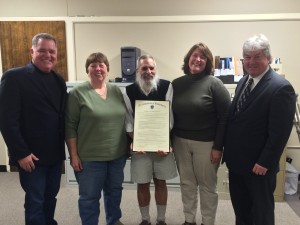Plympton and State sign Community Compact, provide granting in three financially- focused areas
Plympton Selectmen met on Monday, November 30th to discuss an unusually lengthy agenda. They signed the Community Compact with the State in the presence of State Senator Michael Brady and State Representative Thomas Calter, the Board discussed a citizen request for Area 58 Community Access Media

From left, State Representative Thomas Calter, Selectmen Colleen Thompson, Selectmen Chairman Mark Russo, Selectperson Christine Joy and newly elected State Senator Michael Brady pose with the Plympton Community Compact. Photo by Abram Neal.
to broadcast FinCom meetings, they were debriefed on a request to reduce the noise-level of back-up alarms from the Sysco distribution facility, and finally finalized the language of a CORI policy.
Community Compact signing
Selectperson Christine Joy was originally supposed to sign the Community Compact between Plympton and the State on behalf of the Board with the Lieutenant Governor and a group of other towns in Brockton last week; technology unfortunately interfered.
Joy’s GPS sent her to the wrong address, and she missed the ceremony.
All was not lost, however; in fact Plympton got its own special ceremony; Selectmen Chairman Mark Russo signed on behalf of the board with State Representative Thomas Calter and newly-elected State Senator Michael Brady looking on. He signed the agreement with the same pen that the group of towns and the Lieutenant Governor used at the “official” ceremony in Plymouth.
The Community Compact with Plympton will provide grants in three financially- focused areas to hire consultants to help Plympton follow best practices in financial policies and long-range and capital planning.
Broadcasting FinCom meetings
Former Selectman John Henry made a request that FinCom meetings be broadcast by the local television studio, Area 58 Community Access Media.
Although FinCom chair Susan Ossoff, and members Lisa Hart and Marilyn Browne, stated no objection to the meetings being taped, Ossoff insisted that the space they used, a small conference room off the Town Clerk’s office which Henry characterized as a “closet,” worked very well for them. Ossoff made clear that this was not the only characterization in the communication that she found objectionable.
Ossoff stated that the FinCom tries to have “paperless” meetings where they make as much use of a projector as possible and that they have a computer that they work from remotely, which is therefore always on and must be secured.
She was not sure if the dark required for the projector or the size of the room would interfere with a cameraperson’s ability to film the meeting. She also added that there has always been room to accommodate the public should they choose to attend FinCom open sessions.
“If you can find us another space where we can secure our computer, fine. But we are not going to move all of our things for every meeting,” Ossoff said.
Chairman Russo did not think taping FinCom meetings was necessary and the board agreed. “Most of your work is done in the last few weeks before Town Meeting,” he said.
Russo insisted, as he often does, that the public is encouraged to attend public meetings.
Area 58 films 100 meetings or events for the town per year for free.
Beep, beep, beep…
Everyone has heard the ubiquitous alarm warning noise of a large vehicle reversing, such as a bus or a truck. This is for good reason: it is difficult for drivers of large vehicles to see where they are going when they reverse. It’s also federal law.
But, imagine living nearby the Sysco distribution facility where hundreds of trucks pass through everyday, backing into loading docks at all hours.
The noise became particularly offensive to one Brook Street resident who contacted the Town with his concern. Chairman Russo contacted the president of Sysco at his offices in Boston.
The response from Sysco was almost unheard of: the company converted its entire fleet of trucks to a more efficient and quieter reverse warning device that uses “white noise,” according to Russo.
The president also gave a personal tour of the facility to both the resident and Russo.
Russo reports back that noise levels are significantly reduced but most importantly, the trucks are still able to reverse safely – and legally.
CORI, check
The debate on the final wording of the Town’s CORI policy seems to now be final, pending a ten-day public comment period.
The language finally chosen was based on a sample from the state as well as from the Town’s attorney.
Selectperson Joy debated with Russo on whether the policy should be broad or narrow, in terms of which volunteers, committee members, appointed officials and employees are CORI checked. Russo prevailed and the language was kept to what is required by the state: simply put, anyone with the possibility of unsupervised access to vulnerable populations such as the disabled, elderly and children will be checked.
Joy still favors a policy that would CORI anyone applying for any type of license from the Board. She stated that she would like to see the policy revisited at some point.
No matter what the CORI check turns up, it will still be at the discretion of the Selectmen to determine what exactly would disqualify an applicant from a position.